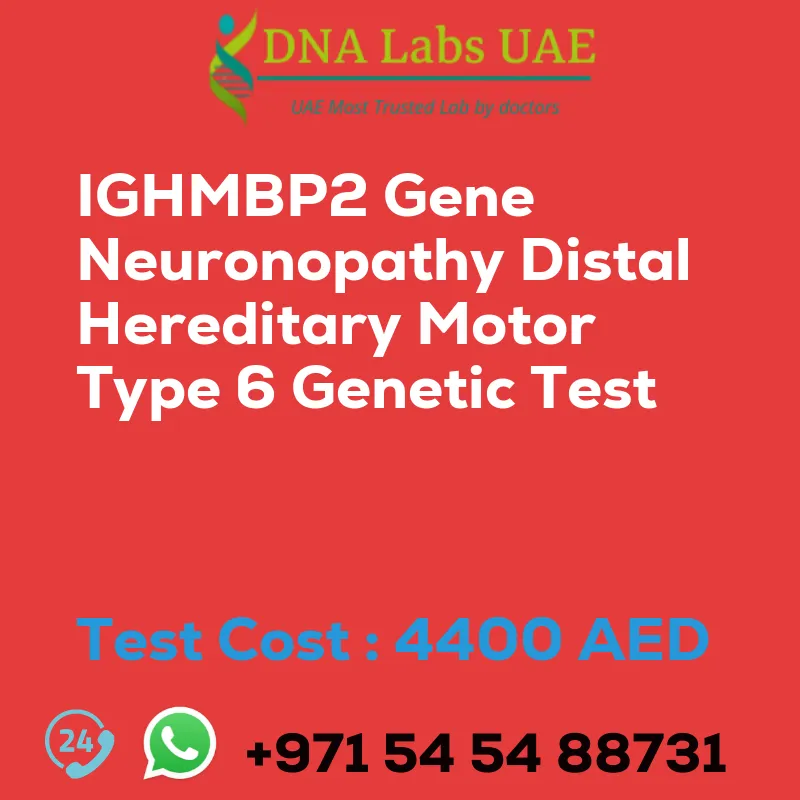IGHMBP2 Gene Neuronopathy distal hereditary motor type 6 Genetic Test
Introduction
The IGHMBP2 gene is associated with a condition called distal hereditary motor neuropathy type 6 (dHMN6), which is a type of neuronopathy. Neuronopathies are a group of disorders that primarily affect the motor neurons, which are the nerve cells responsible for controlling voluntary muscle movement.
dHMN6 is characterized by progressive muscle weakness and wasting, primarily in the distal muscles of the limbs (hands and feet). The symptoms usually begin in adolescence or early adulthood and slowly progress over time. Other common features of dHMN6 may include muscle cramps, sensory abnormalities, and foot deformities.
Test Details
The IGHMBP2 Gene Neuronopathy distal hereditary motor type 6 Genetic Test is a neurology test offered by DNA Labs UAE. The test utilizes NGS (next-generation sequencing) technology to analyze the IGHMBP2 gene and identify specific genetic variations or mutations associated with dHMN6.
Test Components and Price
- Test Name: IGHMBP2 Gene Neuronopathy distal hereditary motor type 6 Genetic Test
- Price: 4400.0 AED
- Sample Condition: Blood or Extracted DNA or One drop Blood on FTA Card
- Report Delivery: 3 to 4 Weeks
- Method: NGS Technology
- Test Type: Neurological Disorders
- Doctor: Neurologist
- Test Department: Genetics
Pre Test Information
Prior to undergoing the IGHMBP2 Gene Neuronopathy distal hereditary motor type 6 Genetic Test, it is recommended to provide the clinical history of the patient. Additionally, a genetic counseling session may be conducted to draw a pedigree chart of family members affected with dHMN6.
Benefits of Genetic Testing
Genetic testing for dHMN6 can provide a definitive diagnosis and identify the specific genetic mutation causing the condition. This information can be useful for genetic counseling, family planning, and potentially for guiding treatment decisions in the future.
Important Considerations
It is important to note that genetic testing for dHMN6 should be conducted under the guidance of a healthcare professional or a genetic counselor who can help interpret the results and provide appropriate recommendations based on the individual’s specific situation.
| Test Name | IGHMBP2 Gene Neuronopathy distal hereditary motor type 6 Genetic Test |
|---|---|
| Components | |
| Price | 4400.0 AED |
| Sample Condition | Blood or Extracted DNA or One drop Blood on FTA Card o |
| Report Delivery | 3 to 4 Weeks |
| Method | NGS Technology |
| Test type | Neurological Disorders |
| Doctor | Neurologist |
| Test Department: | Genetics |
| Pre Test Information | Clinical History of Patient who is going for IGHMBP2 Gene Neuronopathy distal hereditary motor type 6 NGS Genetic DNA Test A Genetic Counselling session to draw a pedigree chart of family members affected with IGHMBP2 Gene Neuronopathy distal hereditary motor type 6 |
| Test Details |
The IGHMBP2 gene is associated with a condition called distal hereditary motor neuropathy type 6 (dHMN6), which is a type of neuronopathy. Neuronopathies are a group of disorders that primarily affect the motor neurons, which are the nerve cells responsible for controlling voluntary muscle movement. dHMN6 is characterized by progressive muscle weakness and wasting, primarily in the distal muscles of the limbs (hands and feet). The symptoms usually begin in adolescence or early adulthood and slowly progress over time. Other common features of dHMN6 may include muscle cramps, sensory abnormalities, and foot deformities. NGS (next-generation sequencing) genetic testing is a type of genetic testing that can analyze multiple genes simultaneously to identify specific genetic variations or mutations. In the case of dHMN6, NGS genetic testing can be used to identify mutations in the IGHMBP2 gene, which can help confirm a diagnosis of dHMN6. Genetic testing for dHMN6 can be helpful in providing a definitive diagnosis, as well as in providing information about the specific genetic mutation causing the condition. This information can be useful for genetic counseling, family planning, and potentially for guiding treatment decisions in the future. It is important to note that genetic testing for dHMN6 should be conducted under the guidance of a healthcare professional or a genetic counselor who can help interpret the results and provide appropriate recommendations based on the individual’s specific situation. |








